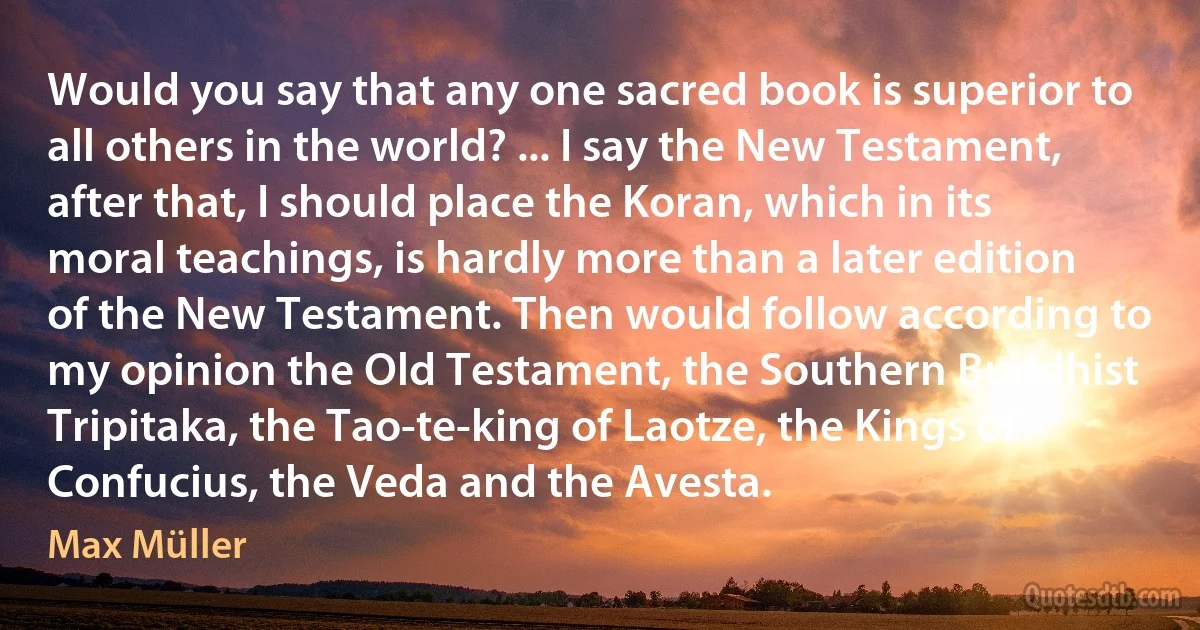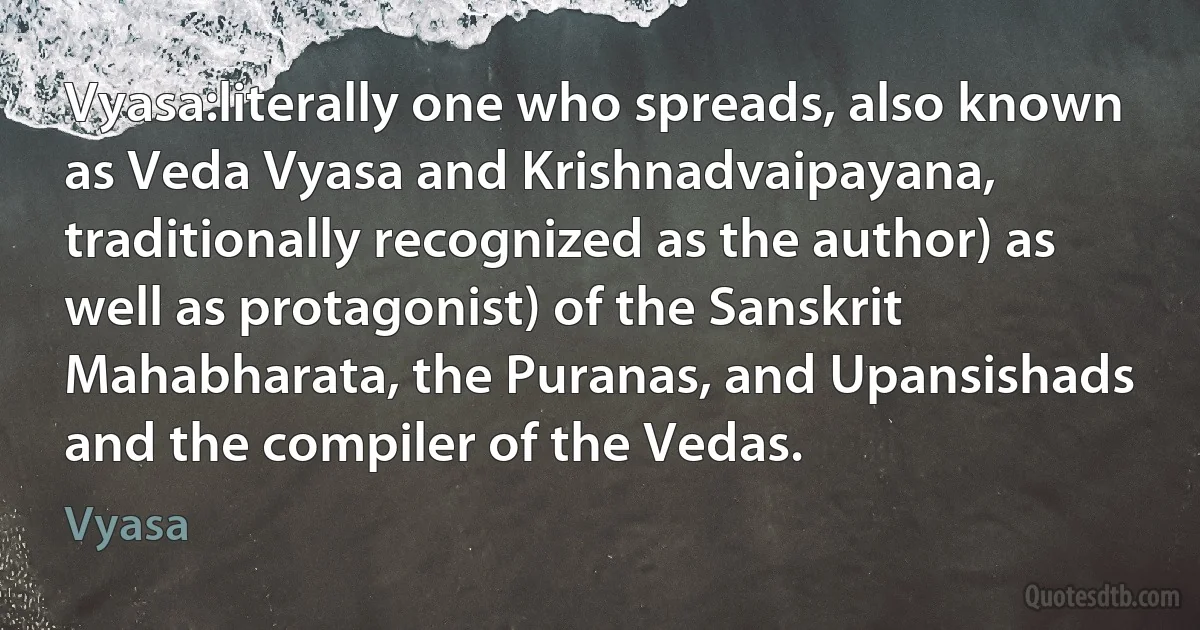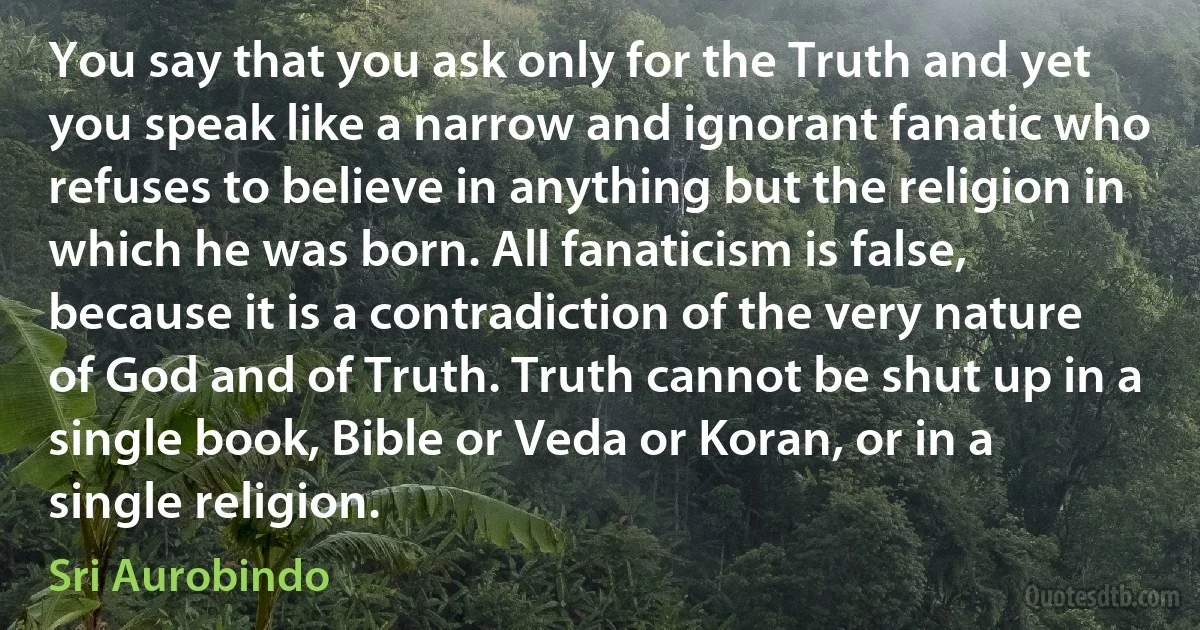Veda Quotes
The translation of the Veda will hereafter tell to a great extent on the fate of India and on the growth of millions of souls in that country. It is the root of their religion, and to show them what the root is, I feel sure, is the only way of uprooting all that has sprung from it during the last 3000 years.

Max Müller
I seek a light that shall be new, yet old, the oldest indeed of all lights.... I seek not science, not religion, not Theosophy, but Veda-the truth about Brahman, not only about His essentiality, but about His manifestation, not a lamp on the way to the forest, but a light and a guide to joy and action in the world, the truth which is beyond opinion, the knowledge which all thought strives after-yasmin vijñate sarvam vijñatam [which being known, all is known]. I believe that Veda to be the foundation of the Sanatan Dharma; I believe it to be the concealed divinity within Hinduism,-but a veil has to be drawn aside, a curtain has to be lifted. I believe it to be knowable and discoverable. I believe the future of India and the world to depend on its discovery and on its application, not to the renunciation of life, but to life in the world and among men.

Sri Aurobindo
Shri Krishna says in the Gita, "I am Vyas among Munis [sages].” Veda Vyas is the heart of our culture, the founder and spokesperson of Vedic dharma. Vyasa was endowed with divine energy. He was great yogi, unfathomable scholar, poet par excellence, accomplished philosopher, great preacher, mighty metaphysical as well as a revered singer and preacher of Krishna bhakthi. Vyasa was a personification of Vishnu and god incarnate.

Vyasa
Guru Purnimma is also called Vyasa Purnimna. On this day Bhagavan Veda Vyasa was born to sage Parashara and a fisherwoman. On this day Bhagavan Vedavyasa is said to have commenced the great work Brahma Sutra. Hence this day is also dedicated to the study of Brahma Sutra. He represents the entire Guru Parampara and he is worshipped very well.

Vyasa
Veda Vyas did not possess four faces, yet he was like Brahma. He did not have four hands yet he acted like Vishnu. He did not have third eye and yet he was like Shiva. "I bow to Vishnu embodied in Vyas and Vyas embodied in Vishnu. One who enriched India through his speech, I bow to thee O Veda Vyas, the poet and creator of destiny and the knower of all.

Vyasa
In the religious traditions of the Hindus, the most important author of sacred texts is Krishna Dvaipayana Vyasa. He is traditionally credited with the arrangement of the Veda into four texts as well as the composition of the epic Mahbharata (Mbh), many Puranas, and other works. Vyasa, however, has been described as mythical as his existence is impossible to prove except in myths and legends such as are preserved in the epic.

Vyasa
Vyasa's activities in the MBh cover the full range of activities traditionally deemed appropriate for a brahmin. Unquestionably Vyasa is the epic's foremost expert on the Veda and the ritual activity enjoined by the Veda. Having rearranged the one Veda into four texts, Vyasa taught those to his five pupils along with MBh as the fifth Veda.

Vyasa
In every third world age (Dvapara), Vishnu, in the person of Vyasa, in order to promote the good of mankind, divides the Veda, which is properly but one, into many portions. Observing the limited perseverance, energy, and application of mortals, he makes the Veda fourfold, to adapt it to their capacities; and the bodily form which he assumes, in order to effect that classification, is known by the name of Veda-vyasa. Of the different Vyasas in the present Manvantara and the branches which they have taught, you shall have an account. Twenty-eight times have the Vedas been arranged by the great Rishis in the Vaivasvata Manvantara... and consequently eight and twenty Vyasas have passed away; by whom, in the respective periods, the Veda has been divided into four. The first... distribution was made by Svayambhu (Brahma) himself; in the second, the arranger of the Veda (Vyasa) was Prajapati...

Vyasa
The Veda may be called primitive, because there is no other literary document more primitive than it; but the language, the mythology, the religion and philosophy that meet us in the Veda open vistas of the past which no one would venture to measure in years. Nay, they contain, by the side of simple, natural, childish thoughts, many ideas which to us sound modern, or secondary and tertiary, as I called them, but which nevertheless are older than any other literary document, and give us trustworthy information of a period in the history of human thought of which we knew absolutely nothing before the discovery of the Vedas.

Max Müller
To call the Veda 'scripture' is a concession to a Western understanding of religion. The Indian term is sruti, meaning 'that which has been perceived through hearing'. For thousands of years, perhaps, the Veda was only transmitted orally, and memorization was the only way to acquire its knowledge....

Klaus Klostermaier
India though it has more than five hundred spoken dialects, has only one sacred language and only one sacred literature, accepted and revered by all adherence of Hinduism alike, however diverse in race, dialect, rank and creed. That language is Sanskrit and Sanskrit literature, the only repository of the Veda or knowledge in its widest sense, the only vehicle of Hindu mythology, philosophy, law, the mirror in which all the creeds, opinions, and customs and usages of the Hindus are faithfully reflected and the only quarry whence the requisite materials may be obtained for improving the vernaculars or for expressing important religious and scientific ideas.

Monier Monier-Williams
We believe that the idea underlying this integral concept of statistics finds adequate expression in the ancient Indian work Sankhya in Sanskrit the usual meaning is ‘number‘, but the original root meaning was ‘determinate knowledge' in the Atharva Veda a derivative from Sankhyata occurs both in the sense of ‘well-known‘ as well as ‘numbered'. The lexicons give both meanings. Amarakosa gives Sankhya – vicarana (deliberation, analysis) as well as ‘number'; also Sankhyavan.

Prasanta Chandra Mahalanobis
Common sense might suggest that here was a striking example of a refutable hypothesis that had in fact been refuted. Indo-European scholars should have scrapped all their historical reconstructions and started again from scratch. But that is not what happened. Vested interests and academic posts were involved. Almost without exception the scholars in question managed to persuade themselves that despite appearances the theories of the philologists and the hard evidence of archeology could be made to fit together. The trick was to think of the horse-riding Aryans as conquerors of the cities of the Indus civilization in the same way that the Spanish conquistadores were conquerors of the cities of Mexico and Peru or the Israelites of the Exodus were conquerors of Jericho. The lowly Dasa of the Rig Veda, who had previously been thought of as primitive savages, were now reconstructed as members of a high civilization.

Edmund Leach



